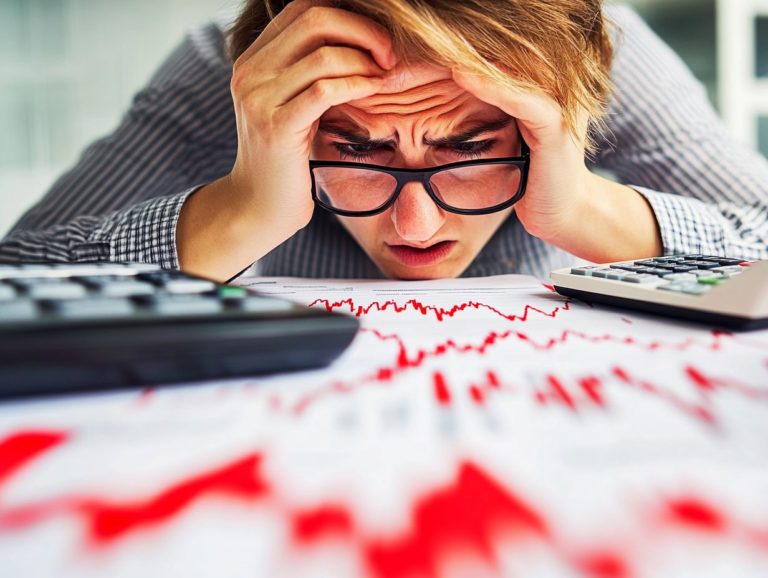How to Prepare for a Market Crash?
Market crashes can hit without warning, leaving you feeling unsettled and questioning what lies ahead.
Grasping the definition and causes of these financial downturns is vital for anyone aiming to protect their investments. This article will guide you through the warning signs to keep an eye on and proactive measures to take before a crash strikes. You will also learn effective strategies for managing your portfolio during tumultuous times.
You ll delve into lessons learned from past crashes, equipping yourself to face future uncertainties with confidence.
Together, you will explore this essential topic that every investor should be well-versed in.
Contents
- Key Takeaways:
- Understanding Market Crashes
- Signs of a Market Crash
- Preparing for a Market Crash
- Managing Investments During a Crash
- Recovering from a Market Crash
- Lessons Learned from Past Market Crashes
- Frequently Asked Questions
- What is a market crash?
- How can I prepare for a market crash?
- Should I try to time the market and sell before a crash?
- What should I do with my investments during a market crash?
- How can I protect my investments from a market crash?
- Is it a good idea to seek professional financial advice when preparing for a market crash?
Key Takeaways:

- Be aware of market crash signs, like economic indicators, to prepare for downturns.
- Protect your investments by diversifying your portfolio and managing risks.
- After a crash, rebuild strategically, adjusting asset allocation based on past lessons.
Understanding Market Crashes
Understanding market crashes is crucial for investors navigating the intricate landscapes of finance, particularly during periods of economic challenges and global recession.
A market crash typically indicates a swift decline in stock prices, often spurred by panic selling and inadequate market liquidity. Such events can usher in extended bear markets, making it imperative to comprehend the underlying factors that can trigger these downturns.
Developing strong strategies for risk management and thoughtful asset allocation will help safeguard your investments.
Definition and Causes
A market crash is a sudden, severe drop in stock prices that can be triggered by various factors, including economic meltdowns and financial crises that shake investor confidence.
These downturns usually do not arise from a single event; instead, they are the culmination of accumulated stresses within the financial system. High levels of debt, declining corporate earnings, and significant geopolitical events all play a role in setting the stage for turbulence.
Key economic indicators, like rising inflation rates, unemployment levels, and shifts in consumer sentiment, can serve as early warning signs of impending turmoil. During periods of heightened market volatility, it s essential to remain vigilant. Certain triggers, such as interest rate hikes or unexpected economic data releases, can amplify fears and lead to panic selling.
Understanding risk management strategies like diversifying your portfolio and hedging investments becomes crucial for navigating the uncertainties that accompany a market crash. By being proactive and prepared, you can better weather the storm when it arrives.
Signs of a Market Crash
Recognizing the signs of a market crash is essential for investors. By doing so, you can safeguard your investments and seize valuable buying opportunities, especially during times of heightened market volatility.
Indicators and Warning Signs
Several key indicators and warning signs can hint at an impending market crash, such as drastic shifts in economic conditions, declining market liquidity, and unusual movements in stock prices.
Rising unemployment rates can serve as a pivotal signal of economic strain, significantly impacting consumer confidence and spending behaviors. As consumers tighten their belts, businesses often feel the pinch, which is reflected in their earnings reports and stock values.
Changes in interest rates can also create ripples across various sectors, influencing your borrowing costs and investment strategies. By grasping these fluctuating dynamics, you become better equipped to evaluate your own risk tolerance, allowing you to prepare strategically for potential downturns while safeguarding your portfolio against unexpected ramifications.
Preparing for a Market Crash

Preparing for a market crash means taking smart steps to protect your finances.
Consider diversifying your portfolio to spread risk across various assets.
Establish a robust emergency fund as a safety net against economic uncertainties.
Take these proactive steps to navigate turbulent times with confidence and resilience.
Steps to Take Before a Crash
Before a market crash strikes, take proactive measures.
Build an emergency fund and consider selling losing investments to reduce taxes.
Reviewing your asset allocation is essential.
This ensures that your investments are diversified across various sectors and asset classes.
Maintaining sufficient liquidity offers you the flexibility needed to access cash when attractive investment opportunities arise.
Evaluate your overall investment strategy to identify outdated practices or risk factors.
Stay informed and make strategic adjustments to weather downturns with confidence.
Managing Investments During a Crash
Managing your investments during a market crash requires a strategic approach.
Prioritize diversification and robust risk management to safeguard your long-term returns.
Diversification and Risk Management
Diversification is a cornerstone of risk management during a market crash.
Spread your investments across alternative assets such as corporate bonds and preferred stocks.
By strategically allocating your capital among various asset classes including real estate, commodities, and cash equivalents you can mitigate the impact of a downturn.
This approach minimizes potential losses while uncovering opportunities for gains in sectors that may outperform in adverse conditions.
For example, during economic instability, while stock prices may nose-dive, certain bonds or real estate investments could hold steady or even appreciate.
Incorporating international assets into your strategy enhances resilience, as these markets might respond differently, providing a buffer against localized downturns.
Recovering from a Market Crash
Recovering from a market crash demands a strategic mindset focused on rebuilding your portfolio.
Seize opportunities during the market’s recovery to restore your financial standing.
This positions you to thrive as the landscape shifts in your favor.
Strategies for Rebuilding Your Portfolio

To effectively rebuild your portfolio after a market crash, consider strategies like dollar cost averaging and dividend investing.
These methods can help cushion you against immediate volatility and encourage a focus on long-term gains.
For instance, by gradually investing a fixed amount over time, you can seize opportunities presented by lower prices, potentially lowering your average cost per share.
Focusing on dividend-paying stocks can create a steady income stream, enhancing your portfolio s resilience.
Maintain a disciplined approach by regularly reviewing your asset allocations and staying informed about market trends.
Lessons Learned from Past Market Crashes
Lessons from past market crashes, like the Great Depression and the Great Recession, offer invaluable insights.
Understanding these historical events equips you to make informed investment decisions and avoid repeating past mistakes.
Historical Examples and Takeaways
Historical examples, such as the market crash of September 2022 and the notorious crash of 1987, provide invaluable insights into market behavior and risk management.
The volatility during these periods reminds us of how unpredictable financial markets can be. Take the 1987 crash; it was triggered by program trading and a lack of market liquidity. This event revealed the risks associated with over-reliance on automated trading systems, which are trading algorithms that execute orders without human intervention.
The downturn in September 2022 showed the importance of having a variety of investments. This downturn was driven by surging inflation and geopolitical tensions, highlighting the need to buffer against sudden market upheavals.
Both scenarios offer compelling lessons for today’s investors. They underscore the importance of proactive strategies and the wisdom of adopting a long-term perspective in the face of market turbulence.
Frequently Asked Questions
What is a market crash?
A market crash is a sudden and significant decline in the overall value of a stock market or financial market. It can be caused by various factors such as economic downturns, political instability, and investor panic.
How can I prepare for a market crash?

One way to prepare for a market crash is to have a well-diversified investment portfolio. This means spreading your investments across different industries and asset classes to minimize risk.
Should I try to time the market and sell before a crash?
Trying to time the market and sell before a crash is not a recommended strategy. It is nearly impossible to predict when a market crash will occur. You might miss out on potential gains if you pull out of the market too soon.
What should I do with my investments during a market crash?
During a market crash, stay calm and think clearly. Avoid making impulsive decisions. Instead, focus on the long-term and consider buying more stocks at discounted prices. This can help balance out any losses and potentially lead to higher returns when the market recovers.
How can I protect my investments from a market crash?
One way to protect your investments is to have a mix of low-risk and high-risk investments. Low-risk investments, such as bonds, provide stability during a market downturn, while high-risk investments, such as stocks, can offer potential for higher returns in the long run.
Is it a good idea to seek professional financial advice when preparing for a market crash?
Yes, seeking professional financial advice can be beneficial when preparing for a market crash. A financial advisor can assess your current portfolio and recommend ways to diversify and protect your investments in case of a market downturn.






